ISLAMABAD: The Supreme Court will take up on Tuesday an appeal against the registrar office’s decision of not accepting a petition seeking establishment of new benches of the Lahore High Court in major cities of Punjab.
A two-judge SC bench consisting of Justice Umar Ata Bandial and Justice Ijaz-ul-Ahsan will commence hearing of the appeal on Oct 22.
The appeal was moved by a senior member of the Pakistan Bar Council (PBC), Raheel Kamran Sheikh, for establishment of new benches of the LHC in cities, like Faisalabad, Gujranwala, Dera Ghazi Khan, Sargodha and Sahiwal.
On Feb 20, Justice Bandial in a chambers’ hearing had overruled the registrar office’s decision taken on the basis that the petitioner did not approach any other appropriate forum available to him under the law and also had failed to justify for directly approaching the apex court.
The issue of additional benches also echoed in a Senate standing committee meeting earlier this year
The issue of setting up additional benches of the LHC also echoed in a meeting of the Senate Standing Committee on Law and Parliamentary Affairs on April 29. Presided over by Senator Javed Abbasi, the meeting had discussed a constitutional amendment bill.
The bill sought to address problems faced by both litigants and lawyers who want cost-effective and early disposal of cases for which high courts’ benches are required in more cities. The bill noted that establishment of more benches of a particular high court was provided in Article 198(4) of the Constitution as the governor might determine on the advice of the cabinet in consultation with the chief justice of that high court.
Lawyers’ protests
PBC member Sheikh moved the petition before the Supreme Court against the backdrop of last year’s protests by the lawyers’ community that lasted over a month.
The petition had sought immediate intervention for the resolution of persistent boycott of courts by lawyers in cities like Faisalabad, Gujranwala, Dera Ghazi Khan, Sargodha and Sahiwal.
Different district bar associations observed strikes and members of the legal fraternity did not appear in the courts of their respective divisions which had badly affected the judicial process in those cities.
Some elements in the bar had even resorted to violent protests when their demand for establishing new benches was not accepted. They damaged properties and locked courtrooms. Footages of such ugly demonstrations had widely been broadcast and available on social media sites, the petition said.
It further said that the Punjab Bar Council had now joined the protests and announced a strike. It urged lawyers to boycott courts.
At the heart of the protest was a meeting of the LHC’s full court in July 2016 which had unanimously rejected the demand for establishment of new benches.
The petition pleaded that as a result of the deadlock, the enforcement of fundamental rights of ordinary citizens was being paralysed and every civilised notion of the rule of law was facing threat of annihilation.
And if the Supreme Court, in exercise of powers conferred upon it by Article 184(3) of the Constitution, does not intervene at this juncture the loss may become irreparable and irreversible and may lead to aggravated use of violent means at the hands of the protesting lawyers or law enforcement agencies.
The petition contended that the LHC’s full court meeting was manifestly arbitrary and discriminatory since it was made behind the closed doors and lacked transparency as no discussion and no reason was advanced. It argued that the LHC was not only a court of constitutional jurisdiction but a court of original, appellate and revisional jurisdiction, both on criminal and civil sides.
At present, Punjab has LHC benches in Multan, Rawalpindi and Bahawalpur whereas Khyber Pakhtunkhwa and Sindh — one third and one half the population size of Punjab, respectively — have equal number of benches. Not only the size of the population of Punjab is three times as that of KP and twice as that of Sindh, the total number of cases filed and pending in the province of Punjab are also many times those filed in the two provinces, the petition contended.
Published in Dawn, October 20th, 2019















































Dear visitor, the comments section is undergoing an overhaul and will return soon.